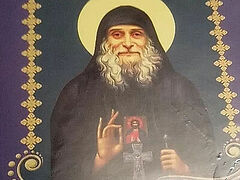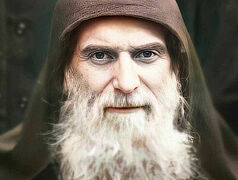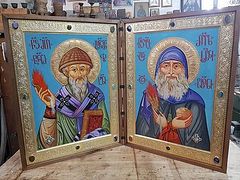From the author: I met Julietta Mikhailovna Varyan, the half-sister of Elder Gabriel, in 2014 while working on my first documentary about St. Gabriel. Her reminiscences have been published in various articles and were included in the films The Elder’s Diadem and I’m Waiting for You in Samtavro.
 R to L: St. Gabriel’s younger sister Julietta, St. Gabriel, his mother Barbara, his older sister Emma
R to L: St. Gabriel’s younger sister Julietta, St. Gabriel, his mother Barbara, his older sister Emma
—From what age do you remember our beloved Elder Gabriel?
—I remember myself very young, from the age of two, but I remember Gabriel clearly from when I saw him fly into the yard. It’s from that moment that I remember him.
—Fly into the yard?
—Yes, he flew in, with his arms and legs stretched out like wings. I was about five then, and he was twelve. Seeing this, my father wept bitter tears, thinking Gabriel (Vasiko)1 had some kind of problem. No one could understand him. And I remember my reaction—I was amazed by what I saw. We had two very devout women living next to us—Nina and Maro. They said in amazement, with fear of God: “Vasiko is a servant of God, a servant of God…”
—Julietta, did Elder Gabriel have any childhood friends? In the courtyard, among the neighbors?
—Everyone would gather in the courtyard, but he didn’t play with anyone. He would build churches out of stones; he would take a stick, tie a rag to it, and walk around like he was in a cross procession. The other kids said that when Vasiko would pick up a stick and run, birds would fly after him; but when they would pick up the same kind of sticks, the birds didn’t fly after them. He wasn’t interested in childish pranks and games. To say he had friends in childhood would be incorrect, but they all got together, and he was courteous to all. He had only the Lord in mind, and he tried to give love to everyone. He loved everyone.
—How did he manifest this love from childhood, or rather, the ability to give love to those around him?
—I remember one time. After my father died, life was hard for us. There were times when we had no food for days, although I didn’t feel any hunger. I went to a girls’ school in Tbilisi. From our house to school were four big tram stops plus a little more. One day, Gabriel was given a piece of bread with some eggplant jam on it. And he carried it in the palm of his hand the whole way to feed me with it. The bell rang for the end of class, and as I left school I saw him standing there, waiting for me with this bread and jam in his hand. He was nineteen then. What feelings he had, what a loving heart he had that he didn’t eat it himself, and even brought me food to school on foot. He was like that his whole life.
—Julietta, we know your mother was initially against Elder Gabriel’s monasticism. What was their relationship like?
—He loved our mother with all his heart, of course. At first, mama wanted him to be a normal child, of course, not spending his days in monasteries. But over time, she saw everything and realized that he was not of this world, although, as a mother, she always protected him and would even give him advice. Mama didn’t like when people would come to Gabriel for advice, for a blessing, because she worried he would get tired. Sometimes she would say: “They come, and come, and come. Leave my child alone.” She would stand right at the gate. And Gabriel accepted everything with love and patience. Sometimes he would comment something to her, but he would always apologize to her after every such incident. He would come—I saw it so many times—and say to her: “Mama, you know how I love you. Forgive me, if I offended you.”
—How did you feel about his strange behavior, his foolishness for Christ?
—I was a young, interesting girl, and my brother was going through trash cans… The neighbors would often say to me: “Julia, we saw him at the dump again…” My heart ached for him, but I didn’t respond to our neighbors. What could I say to them? How could I explain why he was going around to the city dumps? One thing I always felt: He’s pure and could do no wrong. I never made any comments about this, although, as I already told you, there was one time. I was very worried, because people often thought he was drunk. And when I started going to church, I thought I knew everything, so I took the Bible, put a bookmark in 1 Corinthians, and went to see him. I told him: “Gabriel, I want to tell you something.” “Go ahead,” he replied. I opened the Bible and said to him: “It says here that drunkards won’t inherit the Kingdom of Heaven…” I couldn’t finish what I was saying. He was looking at me with such eyes that I closed the book silently, unable to utter a word… I don’t think I said a single word that whole day.
—Did you have a sense that he was a fool for Christ, not of this world?
—You could sense from childhood that he was not of this world. But foolishness for Christ is hard to understand. There was this one time when I was really surprised by the contrast between his strange behavior, people’s opinion about him, and the essence of Gabriel himself. Sometime in 1986, he was in Senaki, in Menji Monastery. I went to visit him. During the morning service, he was standing on the kliros reading the prayers for the service, and he simply lit up. His face was shining, his beard; everything was shining. And I thought in amazement: “Why is he shining? Could my brother be a saint?...”
On the one hand, he was called a drunkard, and on the other hand, he gave such wise advice, and here he was shining. I was astonished.
—The Lord has healed and heals many people by his prayers. Did you notice this during his lifetime?
—Years later, I realized that the Lord had saved me from death by his prayers. He had very strong prayer; he had great boldness before the Lord. At first, we didn’t understand and didn’t attribute the miracles that happened to us, right before our eyes, to Gabriel’s prayers; but now we understand, of course.
—How did Elder Gabriel’s prayers save you from death?
—I had a thyroid gland problem. Some nodules appeared, making it hard to breathe normally, and I would have bouts of suffocation. It also led to heart disease. At the advice of my friends, I went to the Ukrainian city of Chernivtsi for treatment. There was a famous endocrinology center there. They treated me for a month there, although it brought no results. The doctors insisted on surgery, but I was alone and afraid, and I refused. It was a warm December. I left the hospital and went for a walk in the park, thinking about what I should do… While I was lost in thought, I unexpectedly hit something with my foot. I paid in no mind and kept walking for a several yards, but some voice said to me: “Go back, see what you hit.” I went back, and when I looked, I saw the riza of an icon of the Savior. I understood that the Lord was blessing me for the operation. I agreed to the operation, and with God’s help, everything went well. I returned home soon afterwards. The pain, the gasps, and the heart problems were gone. A few days after the surgery, the doctors sent me a letter saying that during the biopsy, the removed cells turned malignant before their eyes. When I got home, the first thing I did was go see my brother. I showed him the icon riza and told him about how I miraculously found it. He smiled, not surprised at all, and took it like it was something normal. He took an icon of the Savior, put it in the riza, and handed it to me. I still have this icon. I had the operation on December 4, 1984—the feast of the Entrance of the Most Holy Theotokos Into the Temple.
Years later, they built a Church of the Entrance of the Theotokos across from my house… Thus, by the prayers of Elder Gabriel, the Lord saved me. Elder Gabriel was such a man of prayer.
 The icon put in the riza by Fr. Gabriel
The icon put in the riza by Fr. Gabriel
—Many today are strengthened and saved by the Lord through the prayers of our beloved Elder Gabriel.
—That’s true. I remember a few years ago, I was in Kanda for church. After the service, a woman of about thirty-five or forty years came up and asked me: “Are you Gabriel’s sister?” “Yes,” I answered. And she told me a story: “I had very bad legs. I couldn’t walk, and nothing helped. One day, I saw Elder Gabriel in a dream, and he said: ‘Julia, come see me, come…’” She went to Gabriel’s relics… “And see how easily I walk now!” she joyfully said to me. She could walk freely, the pain disappeared, and thus she was healed.
Another woman testified about how she was on a boat that was sinking out at sea. It seemed there was no hope of being saved, and suddenly the icon of Elder Gabriel she had with her floated to the surface of the water in the nearly sunken boat. She understood that Gabriel was there. How they wound up on shore no one remembers, but they were all saved.
—What’s it like to be the sister of a saint?
—I have a steady approach to this issue. He was extraordinary even during his lifetime, and I felt that he was a saint. My burden is that it embarrasses me when people pay attention to me. It bothers me when some people think that since I’m Gabriel’s sister, there must be something of Gabriel in me. But people know what sinners we are. I pray for everyone. Many people tell me to tell my brother to help them. So I go to his icon and I say: “Gabriel, this guy’s asking about this… Another about this… Another about this… Help them…” And what I tell him in his ear, he often fulfills. The saints hear everything and respond to God-pleasing requests. This is confirmed for us all the time—that the saints hear us, that they are invisibly with us.
—Do you feel his invisible presence?
—Of course. He has appeared and helped me several times. His words had great power, for he became a brother of Jesus Christ and spoke only that which the Lord put in his mind; and everyone saw the presence and power of Batiushka’s words when we buried our mother. She reposed five years after Gabriel’s repose. During his lifetime, Fr. Gabriel, it turns out, said you mustn’t bury a religious person without placing the absolution prayer in the coffin. Since they didn’t have the prayer printed out at the monastery, we sent people to the Patriarchate. But we couldn’t wait, and we read the prayer and decided to bury her without the absolution prayer. The grave turned out to be unexpectedly narrow, and we couldn’t lower the coffin into it. Everyone was surprised: The grave was wide enough that not just one, but two coffins should have easily fit into it, but the coffin simply wouldn’t go in. By this time, they managed to return from the Patriarchate with the absolution prayer and placed it in our mama’s hand. And what do you know? To our surprise, the coffin was easily lowered in, although the grave hadn’t been widened.
—They love Elder Gabriel everywhere, especially in Rus’. How can you explain this?
—It’s explained by the fact that all Orthodox are one in Christ. I know how much they love Elder Gabriel, and I also love these people very much—the Russians, Ukrainians, and Belarusians.
I was at Samtavro Monastery on May 22. As I was leaving the monastery after the service, I decided to go around to the Chapel of St. Nina in Makvlovani. As we approached the chapel, we saw a Ukrainian delegation of about fifty people. They saw me from a distance and began to shout with such delight: “The film The Elder’s Diadem! Gabriel’s sister!”
Lord, it was so awkward for me, but I was glad to see how much they love the Elder. They sang “Many Years” for me. And they did it all out of love for Elder Gabriel. And in general, such love for our Gabriel as they have in Holy Rus’, I haven’t seen anywhere else. They greatly venerate him.
—Yes, many love Elder Gabriel. What would you say to people who love him so sincerely?
—May their hearts may always be as loving as they are now. Don’t be afraid, and don’t lose faith, no matter how hard things get. Sincerely honor the Lord, and worship Him in spirit and in truth.
***
Appeal to the readers of OrthoChristian.com
Dear friends!
We are now working on a third documentary about St. Gabriel entitled Mama Gabrieli. There is a lot of work ahead of us, and after a short break, shooting has resumed.
We appeal to you to offer your mite towards the making of the film—even the smallest amount is often a big help in such great works.
Donations can be sent via PayPal to diademas@yahoo.com.
When donating funds, please indicate your names in Holy Baptism, and also the names of your departed relatives. All names will be commemorated at the moleben at the relics of St. Gabriel at Samtavro Monastery, and also before the wonderworking icon of Sts. Gabriel and Seraphim of Sarov.
Names can be sent in an email to diademas@yahoo.com.
1 St. Gabriel was born Goderdzi Vasilievich Urgebadze, but was known as Vasiko, in honor of his father who died when he was about two.—Trans.





